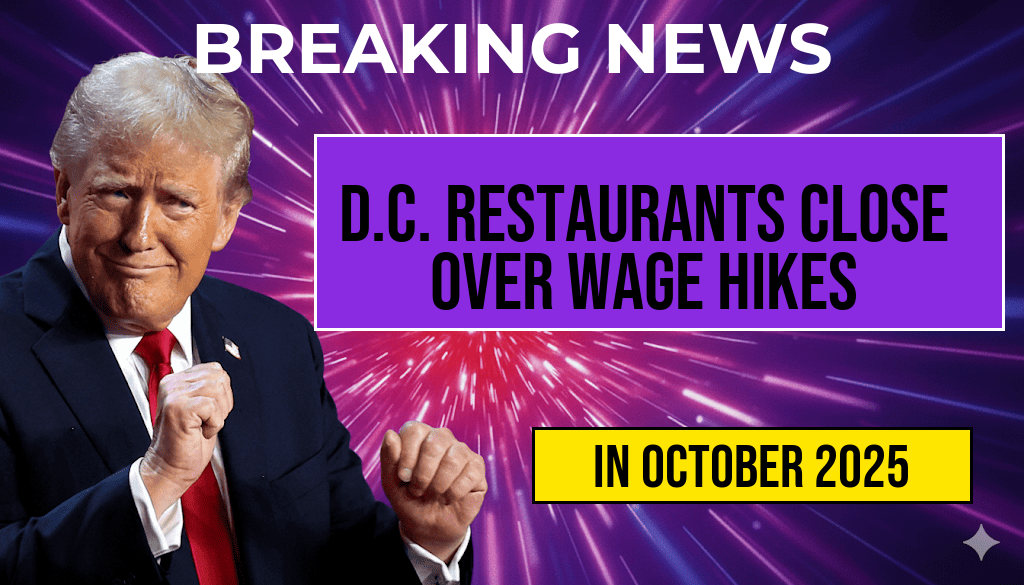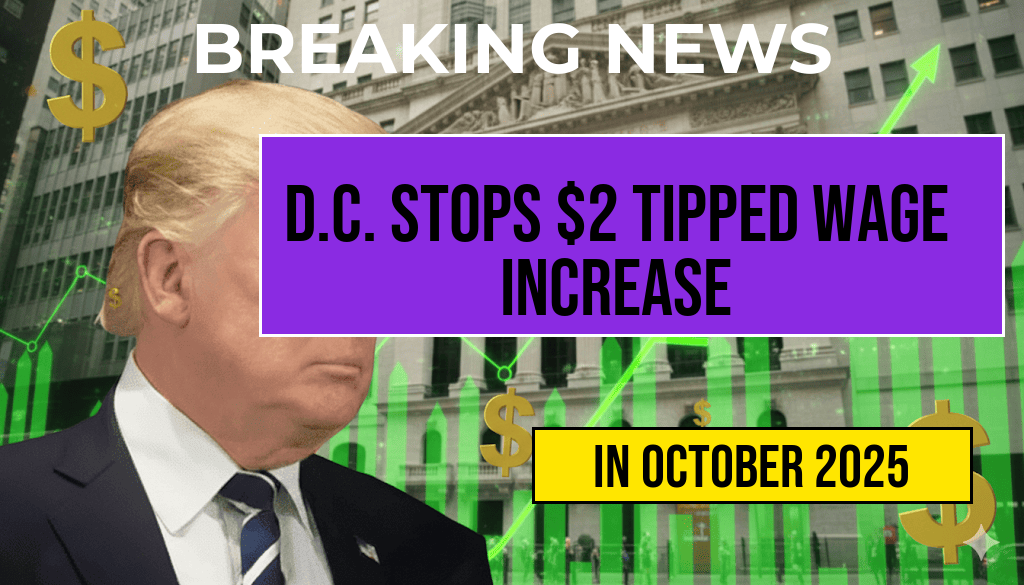Washington D.C. Suspends Planned $2 Tipped-Wage Increase, Potentially Costing Servers Thousands Annually
Washington D.C. officials have halted the scheduled increase to the city’s tipped minimum wage, a move that could leave servers earning approximately $4,160 less annually than initially projected under the previous plan. The decision, announced last week by the D.C. Department of Employment Services, comes amid ongoing debates over wage policies in the hospitality industry and concerns over economic stability for service workers. The original plan aimed to gradually raise the tipped wage from $6.00 to $8.00 per hour by 2025, but recent legislative adjustments have deferred or canceled portions of that increase, prompting industry and advocacy groups to reassess their positions.
Background on D.C.’s Tipped Wage Policy
Washington D.C. has long maintained a tipped minimum wage separate from the standard minimum wage, a practice common across many U.S. jurisdictions. The current tipped wage stands at $6.00 per hour, with the city’s minimum wage at $16.50. The original plan, established through a series of legislative acts, sought to incrementally raise the tipped minimum to $8.00 by 2025, aligning the wage more closely with the city’s overall living costs. Supporters argued that increasing the tipped wage would improve economic security for servers, many of whom rely heavily on tips to supplement their base pay.
Reasons Behind the Suspension of the Wage Increase
The recent suspension stems from multiple factors, including economic uncertainty, inflationary pressures, and opposition from some business groups concerned about increased labor costs. City officials cited the need for further analysis of the potential impact on small businesses and employment levels. A spokesperson for the Department of Employment Services stated, “While we remain committed to fair wages, we must ensure that wage adjustments are sustainable and do not inadvertently harm the very workers they intend to support.” This pause has sparked debate among industry stakeholders and labor advocates, with many warning that the delay could have tangible financial consequences for servers.
Projected Financial Impact on Servers
Based on current data, servers in D.C. earning the tipped minimum wage could see annual income reductions of approximately $4,160 if the increase is fully canceled or delayed. This estimate considers average weekly tips and hours worked, factoring in the difference between the original and halted wage increases. According to industry reports, the typical server in D.C. works around 30-35 hours per week, with tips constituting about 70-80% of total earnings. The loss in supplemental income could significantly affect workers’ ability to meet living expenses, especially considering the high cost of housing and other essentials in the district.
Economic and Social Implications
| Scenario | Average Weekly Tips | Annual Income Difference |
|---|---|---|
| Original plan (full increase) | $150 | $4,160 |
| Current halted plan | $150 | Less $4,160 |
Labor advocates warn that such reductions could exacerbate economic disparities among service workers, many of whom already face unpredictable income streams. Conversely, some business owners argue that the wage freeze might help preserve jobs and keep restaurants afloat in a competitive environment strained by inflation and declining patronage.
Legal and Political Reactions
Several local advocacy groups have voiced disappointment over the decision, emphasizing that fair wages are crucial for economic equity. Rosalind Carter, director of the D.C. Hospitality Workers Alliance, stated, “Delaying wage increases undermines the progress we’ve fought hard to achieve. Our workers deserve a living wage, not a wage cut.” Meanwhile, city council members have called for further discussions and studies before implementing any final adjustments, reflecting ongoing political divisions regarding wage policies.
Looking Ahead
The decision to suspend the tipped-wage increase highlights the complexities of balancing economic growth with workers’ rights. While the city seeks to support local businesses amidst economic headwinds, many servers face the prospect of reduced earnings that could impact their financial stability. As the debate continues, both industry stakeholders and policymakers will need to navigate the challenge of fostering a sustainable economic environment that respects the livelihoods of service workers.
For more insights into wage policies and economic trends, visit Wage Labor on Wikipedia and Forbes.
Frequently Asked Questions
What is the main change in the tipped-wage increase in Washington D.C.?
The city has halted the planned $2 increase in the tipped minimum wage, which was originally scheduled to boost earnings for servers and tipped workers.
How might the halt in the wage increase impact servers’ annual earnings?
Servers could lose up to $4,160 annually compared to the original plan, due to the lack of the scheduled wage increase.
Why was the tipped-wage increase initially proposed?
The increase was aimed at raising income levels for tipped workers and addressing wage disparities in the hospitality industry.
What are the potential implications for restaurant owners and the hospitality industry?
With the halt in the wage increase, restaurant owners might face higher labor costs if they choose to compensate servers differently, potentially impacting profit margins.
When was the original tipped-wage increase scheduled to take effect?
The $2 increase was part of a scheduled plan to be implemented at a certain date, but the city has now paused this plan, with details still being discussed.










